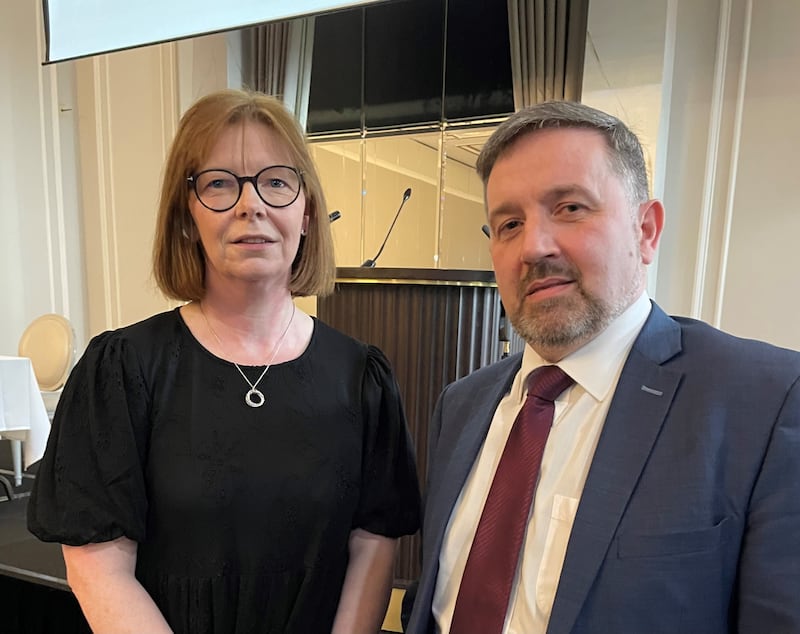The risks of “breakdown” in a range of Northern Ireland’s health services are “real and growing”, Robin Swann has said.
Delivering a speech in Co Antrim, Stormont’s health minister said the system is in “very real trouble”, adding “every part of it is in profound distress”.
In a keynote speech, Health Minister Robin Swann has warned of an “extremely difficult and worsening” financial position for health and social care services.
— Department of Health (@healthdpt) February 27, 2024
Read more at:https://t.co/un78P2sOSl pic.twitter.com/JKtKuODyNH
He warned of an an “extremely difficult and worsening” financial position and said the next year is largely going to be about “damage limitation” given the scale of the budgetary pressures.
Mr Swann returned as Health Minister following the restoration of the powersharing Executive.
He was the guest speaker at a Royal College of General Practitioners (NI) event in Ballymena, where he said his main priorities include securing pay settlements, addressing waiting lists and improving primary care and social care.
He said: “I will want to push forward with improvements and innovations, as resources allow.
“However, much of the focus this year will inevitably be on stabilisation.”
The minister added: “The year ahead is largely going to be about damage limitation for health and social care.
“The main focus will be on preserving and protecting existing services, with all the limitations that they have.
“Even just to manage this, as a system, we are going to have to maximise efficiency and improve performance.
This will mean a continued focus on changing services, consolidating delivery and working collaboratively.”
Pledging to push for the best possible funding settlement for health for 2024/25, he said Northern Ireland is facing “the most challenging fiscal context in any period since the Belfast Agreement”.
Mr Swann also told the event: “I believe we all have a duty to be honest with the public about what we see.
“The risks of service breakdown are real and growing in a range of areas – I do not say this to frighten people but to help build a shared understanding.
“We continue to have expectations and demands of health and social care that we cannot currently meet and on the current trajectory the situation is getting worse rather than better.”
He added: “There’s a huge mismatch between expectations and financial realities.
“Being in Government here is going to involve breaking a lot of bad funding news to a lot of people.
“In health, therefore, the Executive and I will not be able to come close to doing all the things we want to do.”
Mr Swann emphasised that waiting lists cannot be fixed “in isolation from the wider health and social care system”, saying this would be like “trying to repair the wing of a plane mid-flight while the engines are conking out”.
“That’s why the core health budget for next year will be so important. Funding for waiting list initiatives will have much more limited impact if the overall budget is far short of what the system requires.”
Welcoming the decision by trade unions representing health staff to ballot members on a proposed pay settlement, the minister said his options were limited.
“The reality is that implementing the recommendations of independent pay review bodies or mirroring pay settlements in England is at the very limit of what ca be afforded at this juncture.
“That does not address longer term grievances of below-inflation pay awards over the past decade.
“That’s an issue across the public sector, not just in Northern Ireland, but the whole of the UK.
“It was a direct consequence of the policy of austerity adopted in London.
“I don’t think it’s feasible to expect Executive ministers to able to undo those consequences, given the resources we have at our disposal.
“The quarrel, the dispute, is national and if there is a solution it will have to come at a national level.”

Ursula Mason, chairwoman of the Royal College of General Practitioners in Northern Ireland, said Mr Swann’s speech made her optimistic that there was a route through the problems facing the sector.
She acknowledged that pathway would be difficult and there were no “magic wands” to immediately deliver the funding and reform that was required.
But she said the situation was better than six months ago, when she said GPs were “staring into the abyss”.
Dr Mason told colleagues who were concerned about the prospect of having to close their practices that a solution had not yet been achieved.



